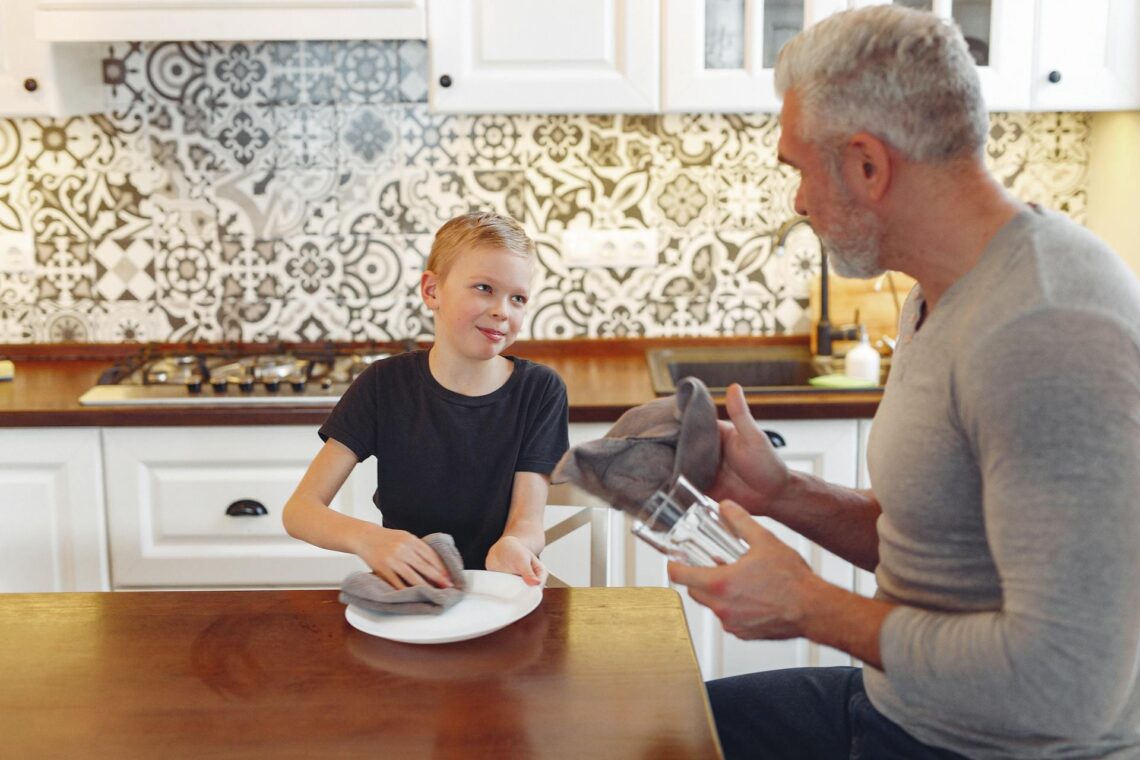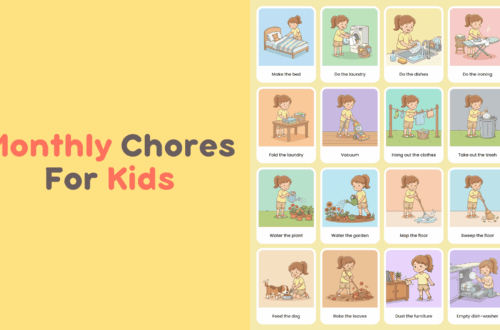Every parent has faced the daily battle: toys on the floor, dishes piled high, and kids who suddenly “forget” how to walk when asked to help. But here’s the truth: chores aren’t just about keeping your home tidy – they’re one of the most effective tools for teaching children responsibility, independence, and life skills.
Research proves it. A University of Minnesota study found that children who began chores early were more likely to succeed in academics, careers, and relationships later in life. Another survey revealed that over 80% of adults who did chores as kids believe it shaped them into more responsible people.
The challenge for parents isn’t whether to assign chores – it’s how to match the right chores to the right age. That’s what this guide will show you: a complete roadmap from toddlers to teens with practical lists, expert tips, and free resources.
👉 Want a shortcut? [Download our free printable chore chart bundle (ages 2-18)] and get started today.
Why Age Matters in Assigning Chores
1. Developmental Readiness
- Toddlers (2-3 years): Learn best by imitation and play.
- Preschoolers (4-5 years): Can handle simple, visual tasks.
- Elementary kids (6-8 years): Ready for multi-step chores with less supervision.
- Preteens (9-12 years): Can take on responsibility with independence.
- Teens (13-18 years): Prepare for adulthood with complex tasks.
2. Confidence vs. Frustration
A 3-year-old asked to fold laundry will give up. A 12-year-old only told to “pick up toys” will get bored. Matching chores to age prevents resistance and builds pride.
3. Chores as Life-Skill Training
- Sweeping today → cooking tomorrow.
- Caring for pets → learning empathy.
- Doing laundry → living independently at college.
Chores by Age Group: The Complete List
Chores for Toddlers (Ages 2-3)
- Pick up toys with guidance.
- Put clothes in the laundry basket.
- Wipe small spills with a towel.
- Carry napkins to the table.
- Help feed pets (with supervision).
💡 Tip: Keep it playful. Toddlers see chores as games, not obligations.
📥 Download: Free Toddler Chore Chart (2-3 years)
Chores for Preschoolers (Ages 4-5)
- Make their bed (even if messy).
- Set and clear the table.
- Sort laundry by color.
- Water indoor plants.
- Brush pets gently.
💡 Tip: Visual charts with stickers work wonders at this age.
Chores for Early Elementary (Ages 6-8)
- Make simple snacks (sandwiches, cereal).
- Sweep or vacuum small areas.
- Fold towels and easy laundry.
- Take out trash.
- Care for pets with reminders.
💡 Tip: Let go of “perfect.” Independence matters more than neatness.
Chores for Preteens (Ages 9-12)
- Cook simple meals.
- Do laundry start-to-finish.
- Vacuum and mop floors.
- Babysit siblings briefly.
- Organize shared spaces.
💡 Tip: Use reward systems (allowance, screen time, privileges) to link effort with reward.
Chores for Teenagers (Ages 13-18)
- Grocery shopping with a budget.
- Yardwork: mowing, raking, shoveling.
- Meal planning and cooking full dinners.
- Full laundry and ironing.
- Running household tasks when parents are away.
💡 Tip: Frame chores as life prep for college and adulthood.
📥 Download: Complete Chore Chart Bundle (2-18 years)
Printable Chore Chart Bundle (Free Download)
We’ve created a printable PDF bundle of chore charts by age – from toddlers to teens. Each chart is visual, age-appropriate, and ready to use.
👉 [Get your free printable chore chart bundle here]
Stick it on the fridge, or better – connect it with the Kikaroo app for a digital, trackable system.
How to Track Chores Effectively (Paper vs. Digital)
Paper charts (see also our Complete Guide to Chore Charts & Tools) are a great start, but they often get:
- Lost on the fridge.
- Forgotten after the first week.
- Ignored when the novelty wears off.
That’s where digital tools shine. With the Kikaroo app:
- Assign chores by age instantly.
- Get automatic reminders (no nagging).
- Reward kids with points or perks.
- Track consistency week over week.
👉 Turn this guide into action with the Kikaroo app – the smart chore tracker that makes parenting easier.
Common Mistakes Parents Make
- Overloading kids → Too many tasks leads to burnout.
- Being inconsistent → Skipping chores teaches kids they’re optional.
- Using chores as punishment → Sends the wrong message. Chores = responsibility, not consequence.
FAQs About Kids and Chores
Should kids get paid for chores?
Some parents do. A balanced approach works: daily chores are expected, extra tasks earn money.
What if my child refuses chores?
Stay consistent. Pair chores with natural consequences and positive reinforcement.
What age should chores start?
As early as 2-3 years. The sooner chores become normal, the less resistance later.
Conclusion: Start Small, Build Habits for Life
Chores aren’t about spotless homes – they’re about raising kids who are responsible, capable, and confident. By introducing age-appropriate chores early, you give your child life skills that last long after childhood.
Start today: choose one chore from your child’s age group, and make it a daily habit.
👉 Download the Kikaroo app and unlock built-in age-based chore templates that make parenting easier.

 Home
Home Features
Features Testimonials
Testimonials Downloads
Downloads FAQ
FAQ Blog
Blog








